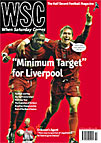 While the Czech Pavel Nedved celebrates being named European Footballer of the Year, Ian Farrell remembers the rapid decline of a previous winner, from slightly further east
While the Czech Pavel Nedved celebrates being named European Footballer of the Year, Ian Farrell remembers the rapid decline of a previous winner, from slightly further east
Such is the general view of football in eastern Europe today, it takes some effort to imagine teams from there electrifying the sport and winning admirers across the world. But in the mid 1980s, Dynamo Kiev, together with the virtually interchangeable USSR side also coached by Valery Lobanovski, took football to another level with a conception of the game as a living machine. Total Football meets applied mathematics. This lent itself easily to Cold War stereotyping – collectivised football played by faceless automata – but the play was a world away from the drabness of the Eastern Bloc, thanks mainly to Oleg Blokhin, Alexander Zavarov and, foremost among them, Igor Belanov.
Though he may not have looked a star athlete, Belanov possessed incredible power and speed, thanks to a club regime more akin to astronaut training than the British model of card schools and star jumps. He certainly impressed France Football, enough to win their Ballon d’Or to become 1986 European Footballer of the Year. A balding and blank-looking Ukrainian had taken the mantle of Michel Platini.
Success had not come easily or quickly, but via many dues-paying seasons at Odessa clubs SKA and Chernomorets. No significant Ukrainian talent goes unnoticed by Dynamo for too long, though, and Belanov was signed up in 1985, aged 24. He had found his spiritual home: excelling at the various physical and mental tests, he became the focus of Dynamo and the Soviet Union’s great white hope.
The following year, Kiev won the Cup-Winners Cup, sweeping Atlético Madrid aside in the final with a breathtaking performance of continual movement and almost blind passing – with that year’s European Cup final unutterably tedious, this proved the high point of the European season by some way. A month later the USSR only reached the last 16 in the World Cup, but scored some of the best goals. Belanov hit four, including a hat-trick in the last-16 defeat to Belgium. One, a 25-yarder that flew through the thin Mexican air as if filmed in time-lapse photography, would be a staple of “great goals” videos for years to come.
People were starting to take notice. But regardless of ability, his Ballon d’Or was a major surprise. A significant factor was that this was a year when football was Maradona, but when European still meant European, so it was something of an also-rans competition. Even so, Gary Lineker, whose Mexico Golden Boot bisected a 40-goal season for Everton and a 20-goal season for Barcelona, had good reason to be peeved with second. The general feeling, shared by Belanov himself, was that the award was really for the team(s) as a whole, with the star forward reckoned the most deserving. Even so, it was an incredible rise to prominence. But almost as quickly, he was gone.
The Soviet team finished runners-up at Euro 88, but Belanov’s tournament ended on a personal low note after missing a penalty against Holland in the final in Munich. It would not be his last disappointment on German soil. By 1989, the USSR had begun to allow some players to move to western Europe. Belanov was one of the first to try his luck, moving to Borussia Mönchengladbach. It was a disaster. Unprepared for life in the west and without the guiding hand of Lobanovski, he floundered, scoring just four goals for Borussia and battling constantly with the management. His wife’s arrest for shoplifting was the last straw and an exit, to lowly Eintracht Braunschweig, was inevitable – European Footballer of the Year to the bottom half of Germany’s second division in four years.
Belanov eventually returned to a Ukraine liberated from Soviet rule and independent, back to play for Chernomorets and to coach Metalurg, before retiring to “Masters Football” and other avenues. Success in bookmaking, a sports dietary business and a soccer school back in Odessa have left him happy enough.
Today, though, the Ballon d’Or is a passport to global fame and a pop-star lifestyle. The idea of a man who really looks like he should be called Igor winning it with an unfashionable team seems incredible now. Then again, it seems incredible that a man presented with the same honour as Franz Beckenbauer and Marco van Basten should have his fame dependent on the continued availability of 101 Great World Cup Goals.
If only in the bargain bins, his legend will live on.
From WSC 204 February 2004. What was happening this month